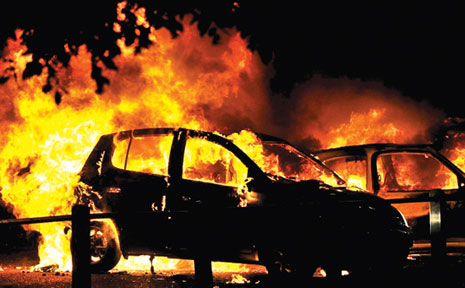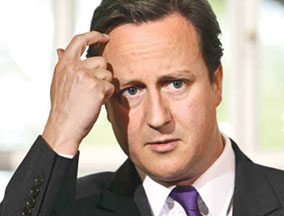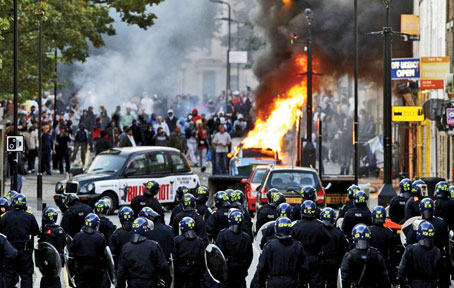Londonís hour of shame
By Pramod DE SILVA
"When a man is tired of London he is tired of Life," said Samuel
Johnson. It is indeed an apt description of a city that offers so much
to see and do. Though steeped in history and tradition, London is very
much a modern cosmopolitan city that offers new perspectives to both
residents and visitors alike. And in less than one year from now, it is
due to hold that most modern of spectacles - the Summer Olympics.

 |
|
British Prime Minister
David Cameron |
But right now, London (and indeed the rest of England) is in trouble.
The long nights of restlessness may have faded, but the embers and ashes
still remain, not to mention the mental scars. It was disgraceful and
embarrassing too. Perhaps the last time that London burned like this was
in 1666, in the Great Fire of London. But London rose from the ashes
like the proverbial phoenix on that occasion as well as after the two
Great Wars. This time, it faces a long, hard road ahead.
It is difficult not to feel sad about the whole saga of London riots,
even from 10,000 Km away. I have been to many of the areas and
neighbourhoods in London (and Manchester) that were in flames and one
immediately senses the senselessness of the destruction.
England will necessarily have to turn the searchlight inwards as it
grapples with the worst riots in living memory. With the Olympics less
than a year away, it simply could not afford a battering of its image on
this scale.
Instead of generalising the riots totally as an orgy of consumerist
thievery organised by criminal gangs, the authorities as well as the
society must probe the root causes of the simmering discontent that
prevails especially among the youth population and minority segments.
The economic recession, unemployment and social welfare cuts have led to
frustration among many segments of society.
True, criminal elements are by and large responsible for most of the
damage, but most analysts have found fault with Prime Minister David
Cameron's assertion that the riots were "criminality, pure and simple".
Some of the rioters were as young as 11. What could drive such a young
person to become a rioter?
There is a debate on how and why the riots started. The fatal
shooting by Police of Mark Duggan, a 29-year-old black person, is often
said to be the cause that triggered the riots. Various theories exist on
what exactly happened at the shooting site. According to some accounts,
Duggan had shot at the police first. Other accounts say he did not.
Duggan has been described as a gangster and drug dealer. Just like any
other big city, London has its own troubles with the underworld.
Can of worms
The shooting of Duggan as well as the riots that followed have also
opened a can of worms on police action or rather, inaction. There was a
lot of criticism that the police did not act swiftly and in enough
numbers to quell the riots. Furthermore, there is widespread resentment
that the police are not doing enough to tackle crime in the major
cities.

 |
|
Mark Duggan whose death sparked the
riots |
The metropolitan police itself will have to conduct a critical
assessment of its own actions. Indeed, Londoners had to come together to
help each other and stop the riots, which in some cases extended to
vigilante action. In the wake of the riots, Londoners have been calling
for tougher policing, even if it meant extreme measures not normally
adopted in democracies, to protect life and property of citizens.
A YouGov poll for the Sun newspaper published Wednesday showed 90
percent of those surveyed calling for the use of water cannons against
rioters, 77 percent supporting the deployment of the army and 33 percent
saying that the police should be permitted to fire live ammunition.
The riots have also brought a series of other issues to the fore,
including the question of national security, personal freedoms and human
rights. Some years ago, there was a furore over a plan to introduce
National ID cards in Britain. It already has the highest number of CCTV
cameras per person; you cannot walk 100 metres without getting caught on
camera and CCTV tape somewhere. Some have even termed this 'Big Brother'
a la George Orwell. Some already see this as an attempt to monitor
people's movements all the time.
Social networks
Britain and all other democracies now face another factor - social
networks. Western democracies did not hide their pleasure over the role
played by Facebook, Twitter and other social networking sites in the
'Arab Spring' which resulted in the ouster of certain regimes in the
region. They were hailed as a new fountain of democratic expression.
However, the London riots have revealed the dark side of social
networks.
It has been disclosed that hooded youth communicated via Blackberry
Messenger, Twitter and Facebook to mobilise gangs for looting and arson
sprees. With this development, Britain is weighing whether to block
statements of violence on social media sites and give police the
authority to order people to remove face coverings in areas where
criminality is suspected.
Prime Minister Cameron has told Parliament that the Government is
looking at whether there should be limits on social media sites like
Twitter and Facebook if they are being used to spread disorder.
"Everyone watching these horrific actions will be stuck by how they
were organised via social media," Cameron told British lawmakers in an
emergency session of Parliament. "Free flow of information can be used
for good. But it can also be used otherwise. And when people use social
media for violence we need to stop them."
Human rights
Cameron also said he would move to publish images of rioters captured
by surveillance cameras, without "any phony concerns about human rights
getting in the way." This statement is sure to spark a debate on human
rights vs personal liberties and privacy in countries that often portray
themselves as champions of human rights worldwide. In any case, these
events show that freedom of expression cannot be used without limits
even in a democracy.
The London riots are a stark reminder to governments worldwide that
they should address social issues and crime before they assume
unmanageable and even ugly proportions. It is vital to address the
concerns of youth, because it is easy for criminal elements to lure them
to a life of drugs and crime if the authorities do not have solutions to
their problems.
The economic damage from the riots will run into billions of sterling
pounds, but even worse is the collective trauma that British citizens
will have to endure for years to come. It is a massive blot on their
conscience. It could lead to a fundamental shift in the very nature of
governance.
There has to be a thorough investigation on all aspects of the
disturbances and corrective measures must be taken.
The riots in England would no doubt become a case study for all
democracies worldwide, who may find that lofty ideals and ground
realities do not always mix together.
|

